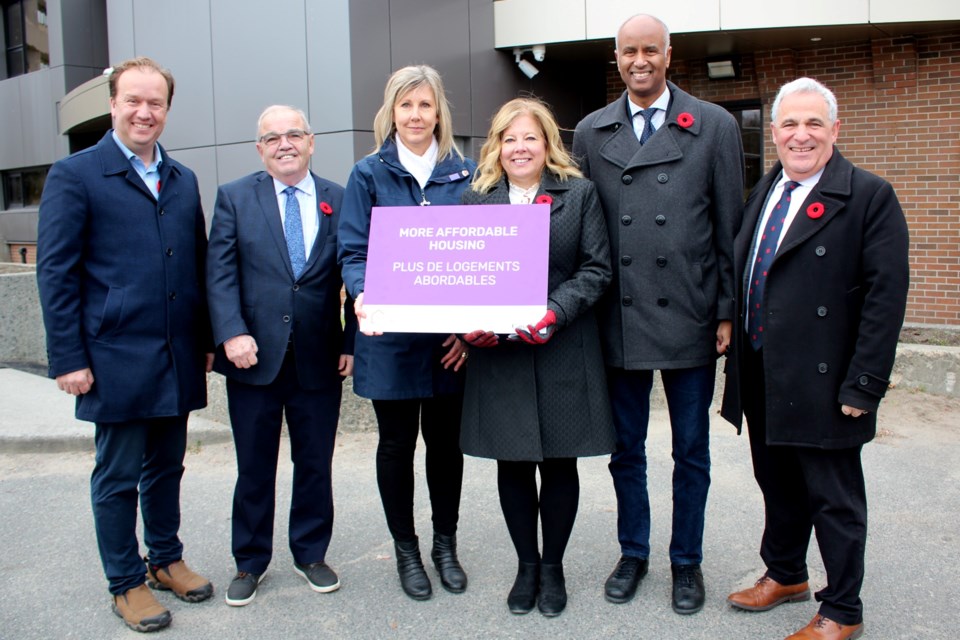A press conference held Wednesday drew attention to “life-saving” programs offered by the Canadian Mental Health Association at 200 Larch St. in downtown Sudbury.
That includes the CMHA Sudbury/Manitoulin’s Harm Reduction Home, which is a 15-bed residential managed alcohol consumption program, as well as the 35-bed Off the Street low-barrier shelter for the city’s vulnerable population.
A total of $3.4 million in government dollars went into the building and services at the location, including $2.5 million from the federal government under the National Housing Co-Investment Fund.
The National Housing Co-Investment Fund (NHCF) is a program under the National Housing Strategy (NHS) that gives priority to projects that help people who need it most, including women and children fleeing family violence, seniors, Indigenous peoples, people living with disabilities, those with mental health or addiction issues, veterans, and young adults.
The City of Greater Sudbury and the Canadian Mental Health Association contributed approximately $35,000 and $765,000, respectively.
The Off the Street shelter opened back in 2019, while the managed alcohol program has been operating since 2013, although it only moved to 200 Larch in July 2020.
The building also houses a Sudbury District Nurse Practitioner Clinic, offering primary health care to marginalized and homeless people.
Unfortunately, there have been ongoing staffing shortages with the Off the Street shelter, which has recently caused it to close its overnight services six times in six months. Shortages are due to both illness, the COVID-19 pandemic, but also, difficulty recruiting.
Stephanie Lefebvre, director of programs and planning for CMHA Sudbury/Manitoulin, told Sudbury.com recently there is a job posting that has been up since February, with no takers.
CMHA Sudbury/Manitoulin CEO Patty MacDonald said at the press conference the organization was only approved for the federal dollars in late 2021, which were essential in funding the downtown facility’s renovation for their programs.
“They are life-saving programs,” she said, adding that these programs also relieve stress on services such as the hospital, police and paramedics.
“But I think that most importantly, it saves lives to have a shelter, as well as a managed alcohol program provide some safety and the beginning of a journey for an individual to their wellness.”
The funding announcement was attended by federal Housing Minister Ahmed Hussen, as well as local MPs Viviane Lapointe (Sudbury) and Marc Serré (Nickel Belt), Deputy Mayor and Ward 8 Coun. Al Sizer and Mayor-Elect Paul Lefebvre.
“How we treat our most vulnerable is a true reflection of who we are as a society,” said Hussen.
“We have to do everything that we can to be there for people to give them the wraparound supports that they need, but to also give them access to shelter space, transitional housing, and yes, eventually permanent housing solutions.”
Serré said the work being done at 200 Larch is “truly remarkable.”
He said he wanted to thank the CMHA and other funding partners for bringing the aforementioned projects forward.
“Because if you don't put the proposals together, if you don't develop the projects, then (Sudbury MP Viviane Lapointe) and I can’t advocate for you,” he said. “And kudos to (CMHA CEO Patty MacDonald) and her team, for making sure you put those projects forward and you make sure that we get the services that we need for the area.”
There are other services available in Sudbury, but not always available to all.
Cedar Place is an emergency shelter for women aged 20 and older, or families with children. Located at 261 Cedar St., it is open 24 hours a day, seven days a week. There are 22 beds available but they are referral only.
The Sudbury Action Centre for Youth provides four emergency shelter beds for youth aged- 16-to-24 at 95 Pine St. The Elizabeth Fry Society provides nine emergency shelter beds for women and gender-diverse individuals aged 19 and over. During daytime hours, the Elgin Street Mission and Blue Door Soup Kitchen offer indoor dining and drop-in services.
The City of Greater Sudbury will not be opening a daytime warming centre this year, as they did during the pandemic.
As of Oct. 26, there are 178 people who are actively homeless (13 staying in encampments, 72 unsheltered, 51 in shelters, and 42 are provisionally accommodated or “unknown,”).
Heidi Ulrichsen is Sudbury.com’s associate content editor. She also covers education and the arts scene.
